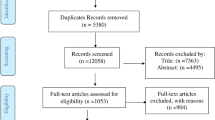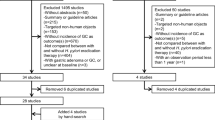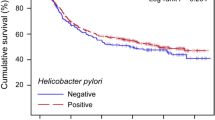Abstract
Objective
Helicobacter pylori infection is the most important risk factor for gastric cancer, but no association with cardia cancer has been recognized. However, a heterogeneous distribution of etiologically distinct types of cardia cancer may contribute to explain conflicting findings between studies in high- and low-risk settings. We aimed to quantify the association between H. pylori infection and gastric cardia cancer through meta-analysis, and to provide an explanation for the expected heterogeneity of results.
Methods
We systematically reviewed published studies addressing the association between H. pylori infection and gastric cardia cancer (up to June 2009), and extracted relative risk (RR) estimates for the association with cardia and non-cardia cancers. Summary RR estimates and 95% confidence intervals (95% CI) were computed using random-effects models. Subgroup analyses were conducted, namely according to gastric cancer risk settings.
Results
Thirty-four articles were considered for meta-analysis. For cardia cancer, summary RR was 1.08 (95% CI 0.83–1.40; I 2 = 52.8%), higher in high-risk (RR = 1.98; 95% CI 1.38–2.83; I 2 = 18.4%) than in low-risk settings (RR = 0.78; 95% CI 0.63–0.97; I 2 = 11.6%). For non-cardia cancer, RR estimates were similar in high- (RR = 3.02; 95% CI 1.92–4.74; I 2 = 90.7%) and low-risk settings (RR = 2.56; 95% CI 1.99–3.29; I 2 = 46.6%). These observations were consistent across different inclusion criteria and when accounting for the virulence of the infecting strains.
Conclusions
In high-risk settings, a positive association between H. pylori infection and gastric cancer was observed both for cardia and non-cardia cancers. The results support the hypothesis of a heterogeneous distribution of etiologically distinct types of cardia cancer.






Similar content being viewed by others
References
Parkin DM, Whelan SL, Ferlay J, Teppo L, Thomas BD (2002) Cancer incidence in five continents. IARC Sci Publ No. 155. IARC, Lyon
Armstrong RW, Borman B (1996) Trends in incidence rates of adenocarcinoma of the oesophagus and gastric cardia in New Zealand, 1978–1992. Int J Epidemiol 25:941–947
Bertuccio P, Chatenoud L, Levi F et al (2009) Recent patterns in gastric cancer: a global overview. Int J Cancer 125:666–673
Hansen S, Wiig JN, Giercksky KE, Tretli S (1997) Esophageal and gastric carcinoma in Norway 1958–1992: incidence time trend variability according to morphological subtypes and organ subsites. Int J Cancer 71:340–344
Pera M, Cameron AJ, Trastek VF, Carpenter HA, Zinsmeister AR (1993) Increasing incidence of adenocarcinoma of the esophagus and esophagogastric junction. Gastroenterology 104:510–513
Moller H (1992) Incidence of cancer of oesophagus, cardia and stomach in Denmark. Eur J Cancer Prev 1:159–164
Harrison SL, Goldacre MJ, Seagroatt V (1992) Trends in registered incidence of oesophageal and stomach cancer in the Oxford region, 1974–88. Eur J Cancer Prev 1:271–274
Levi F, La Vecchia C, Te VC (1990) Descriptive epidemiology of adenocarcinomas of the cardia and distal stomach in the Swiss Canton of Vaud. Tumori 76:167–171
Thomas RJ, Lade S, Giles GG, Thursfield V (1996) Incidence trends in oesophageal and proximal gastric carcinoma in Victoria. Aust N Z J Surg 66:271–275
Correa P, Haenszel W, Cuello C, Tannenbaum S, Archer M (1975) A model for gastric cancer epidemiology. Lancet 2:58–60
Popiela T, Kulig J, Kolodziejczyk P, Sierzega M (2002) Changing patterns of gastric carcinoma over the past two decades in a single institution: clinicopathological findings in 1557 patients. Scand J Gastroenterol 37:561–567
Lee JY, Kim HY, Kim KH et al (2003) No changing trends in incidence of gastric cardia cancer in Korea. J Korean Med Sci 18:53–57
Blot WJ, Devesa SS, Kneller RW, Fraumeni JF Jr (1991) Rising incidence of adenocarcinoma of the esophagus and gastric cardia. JAMA 265:1287–1289
Bouvier AM, Esteve J, Mitry E, Clinard F, Bonithon-Kopp C, Faivre J (2002) Trends in gastric cancer incidence in a well-defined French population by time period and birth cohort. Eur J Cancer Prev 11:221–227
Crane SJ, Richard Locke G III, Harmsen WS et al (2007) The changing incidence of oesophageal and gastric adenocarcinoma by anatomic sub-site. Aliment Pharmacol Ther 25:447–453
Huang JQ, Hunt RH (2003) The evolving epidemiology of Helicobacter pylori infection and gastric cancer. Can J Gastroenterol 17(Suppl B):18B–20B
Eslick GD, Lim LL, Byles JE, Xia HH, Talley NJ (1999) Association of Helicobacter pylori infection with gastric carcinoma: a meta-analysis. Am J Gastroenterol 94:2373–2379
Huang JQ, Sridhar S, Chen Y, Hunt RH (1998) Meta-analysis of the relationship between Helicobacter pylori seropositivity and gastric cancer. Gastroenterology 114:1169–1179
Webb PM, Law M, Varghese C, Forman D, Yuan JM, Yu M, Ross R, Limberg PJ, Mark SD, Taylor PR, Dawsey SM, Qiao YL, Aromaa A, Knekt P, Kosunen TU, Heinonen OP, Virtamo J, Tulinius H, Watanabe Y, Ozasa K, Kurata JH, Hansen S, Melby KK, Aase S, Jellum E, Vollset SE, Siman JH, Forsgren A, Berglund G, Floren CH, Lin JT, Chen CJ, Wald NJ, Parsonnet J, Friedman GD, Blaser MJ, Nomura A, Stemmermann GN (2001) Gastric cancer and Helicobacter pylori: a combined analysis of 12 case control studies nested within prospective cohorts. Gut 49:347–353
Huang JQ, Zheng GF, Sumanac K, Irvine EJ, Hunt RH (2003) Meta-analysis of the relationship between cagA seropositivity and gastric cancer. Gastroenterology 125:1636–1644
Dawsey SM, Mark SD, Taylor PR, Limburg PJ (2002) Gastric cancer and H. pylori. Gut 51:457–458
Limburg P, Qiao Y, Mark S et al (2001) Helicobacter pylori seropositivity and subsite-specific gastric cancer risks in Linxian, China. J Natl Cancer Inst 93:226–233
Chow WH, Blaser MJ, Blot WJ et al (1998) An inverse relation between cagA + strains of Helicobacter pylori infection and risk of esophageal and gastric cardia adenocarcinoma. Cancer Res 58:588–590
Brenner H, Arndt V, Stegmaier C, Ziegler H, Rothenbacher D (2004) Is Helicobacter pylori infection a necessary condition for noncardia gastric cancer? Am J Epidemiol 159:252–258
Nomura AM, Kolonel LN, Miki K et al (2005) Helicobacter pylori, pepsinogen, and gastric adenocarcinoma in Hawaii. J Infect Dis 191:2075–2081
Kamangar F, Dawsey SM, Blaser MJ et al (2006) Opposing risks of gastric cardia and noncardia gastric adenocarcinomas associated with Helicobacter pylori seropositivity. J Natl Cancer Inst 98:1445–1452
Talley NJ, Zinsmeister AR, Weaver A et al (1991) Gastric adenocarcinoma and Helicobacter pylori infection. J Natl Cancer Inst 83:1734–1739
Shibata T, Imoto I, Ohuchi Y et al (1996) Helicobacter pylori infection in patients with gastric carcinoma in biopsy and surgical resection specimens. Cancer 77:1044–1049
Fukuda H, Saito D, Hayashi S et al (1995) Helicobacter pylori infection, serum pepsinogen level and gastric cancer: a case–control study in Japan. Jpn J Cancer Res 86:64–71
Kim HY, Cho BD, Chang WK et al (1997) Helicobacter pylori infection and the risk of gastric cancer among the Korean population. J Gastroenterol Hepatol 12:100–103
Kamangar F, Qiao YL, Blaser MJ et al (2007) Helicobacter pylori and oesophageal and gastric cancers in a prospective study in China. Br J Cancer 96:172–176
Lunet N (2006) Gastric cancer frequency and trends. Arq Med 20:79–85
Wu AH, Crabtree JE, Bernstein L et al (2003) Role of Helicobacter pylori CagA + strains and risk of adenocarcinoma of the stomach and esophagus. Int J Cancer 103:815–821
Shen J, Wang RT, Wang LW, Xu YC, Wang XR (2004) A novel genetic polymorphism of inducible nitric oxide synthase is associated with an increased risk of gastric cancer. World J Gastroenterol 10:3278–3283
Kokkola A, Louhimo J, Puolakkainen P, Alfthan H, Haglund C, Rautelin H (2005) Helicobacter pylori infection and low serum pepsinogen I level as risk factors for gastric carcinoma. World J Gastroenterol 11:1032–1036
Held M, Engstrand L, Hansson LE, Bergstrom R, Wadstrom T, Nyren O (2004) Is the association between Helicobacter pylori and gastric cancer confined to CagA-positive strains? Helicobacter 9:271–277
Queiroz DM, Mendes EN, Rocha GA et al (1998) CagA-positive Helicobacter pylori and risk for developing gastric carcinoma in Brazil. Int J Cancer 78:135–139
Yamaoka Y, Kodama T, Kashima K, Graham DY (1999) Antibody against Helicobacter pylori CagA and VacA and the risk for gastric cancer. J Clin Pathol 52:215–218
Mitchell H, English DR, Elliott F et al (2008) Immunoblotting using multiple antigens is essential to demonstrate the true risk of Helicobacter pylori infection for gastric cancer. Aliment Pharmacol Ther 28:903–910
Lin JT, Wang JT, Wang TH, Wu MS, Lee TK, Chen CJ (1993) Helicobacter pylori infection in a randomly selected population, healthy volunteers, and patients with gastric ulcer and gastric adenocarcinoma. A seroprevalence study in Taiwan. Scand J Gastroenterol 28:1067–1072
Lee BM, Jang JJ, Kim JS et al (1998) Association of Helicobacter pylori infection with gastric adenocarcinoma. Jpn J Cancer Res 89:597–603
Kikuchi S, Crabtree JE, Forman D, Kurosawa M (1999) Association between infections with CagA-positive or -negative strains of Helicobacter pylori and risk for gastric cancer in young adults. Research Group on Prevention of Gastric Carcinoma Among Young Adults. Am J Gastroenterol 94:3455–3459
Higgins JP, Thompson SG (2002) Quantifying heterogeneity in a meta-analysis. Stat Med 21:1539–1558
GLOBOCAN 2002 (2004) Cancer incidence, mortality and prevalence worlwide [database on the Internet]. IARC Press, Lyon
Society AC (2004) Hawaii cancer facts & figures 2003–2004
Crew KD, Neugut AI (2006) Epidemiology of gastric cancer. World J Gastroenterol 12:354–362
Curado MP, Edwards B, Shin HR, Storm H, Ferlay J, Heanue M, Boyle P (eds) (2007) Cancer incidence in five continents, vol IX. IARC Scientific Publications No. 160. IARC, Lyon
Parsonnet J, Friedman GD, Vandersteen DP et al (1991) Helicobacter pylori infection and the risk of gastric carcinoma. N Engl J Med 325:1127–1131
Lin JT, Wang JT, Wang TH, Wu MS, Chen CJ (1993) Helicobacter pylori infection in early and advanced gastric adenocarcinoma: a seroprevalence study in 143 Taiwanese patients. Hepatogastroenterology 40:596–599
Hansson LE, Engstrand L, Nyren O et al (1993) Helicobacter pylori infection: independent risk indicator of gastric adenocarcinoma. Gastroenterology 105:1098–1103
Kikuchi S, Wada O, Nakajima T et al (1995) Serum anti-Helicobacter pylori antibody and gastric carcinoma among young adults. Research Group on Prevention of Gastric Carcinoma among Young Adults. Cancer 75:2789–2793
Webb PM, Yu MC, Forman D et al (1996) An apparent lack of association between Helicobacter pylori infection and risk of gastric cancer in China. Int J Cancer 67:603–607
Siman JH, Forsgren A, Berglund G, Floren CH (1997) Association between Helicobacter pylori and gastric carcinoma in the city of Malmo, Sweden. A prospective study. Scand J Gastroenterol 32:1215–1221
Brenner H, Arndt V, Sturmer T, Stegmaier C, Ziegler H, Dhom G (2000) Individual and joint contribution of family history and Helicobacter pylori infection to the risk of gastric carcinoma. Cancer 88:274–279
Brenner H, Arndt V, Bode G, Stegmaier C, Ziegler H, Stumer T (2002) Risk of gastric cancer among smokers infected with Helicobacter pylori. Int J Cancer 98:446–449
Enroth H, Kraaz W, Rohan T, Nyren O, Engstrand L (2002) Does the method of Helicobacter pylori detection influence the association with gastric cancer risk? Scand J Gastroenterol 37:884–890
Gonzalez CA, Jakszyn P, Pera G et al (2006) Meat intake and risk of stomach and esophageal adenocarcinoma within the European Prospective Investigation into Cancer and Nutrition (EPIC). J Natl Cancer Inst 98:345–354
Gonzalez CA, Pera G, Agudo A et al (2006) Fruit and vegetable intake and the risk of stomach and oesophagus adenocarcinoma in the European Prospective Investigation into Cancer and Nutrition (EPIC-EURGAST). Int J Cancer 118:2559–2566
Hansen S, Vollset SE, Derakhshan MH et al (2007) Two distinct aetiologies of cardia cancer; evidence from premorbid serological markers of gastric atrophy and Helicobacter pylori status. Gut 56:918–925
Ren JS, Qiao YL (2008) Helicobacter pylori infection and gastric cardia cancer: a nested case–control study. Zhonghua Zhong Liu Za Zhi 30:428–431
Estevens J, Fidalgo P, Tendeiro T et al (1993) Anti-Helicobacter pylori antibodies prevalence and gastric adenocarcinoma in Portugal: report of a case–control study. Eur J Cancer Prev 2:377–380
Blaser MJ, Perez-Perez GI, Kleanthous H et al (1995) Infection with Helicobacter pylori strains possessing cagA is associated with an increased risk of developing adenocarcinoma of the stomach. Cancer Res 55:2111–2115
Aromaa A, Kosunen TU, Knekt P et al (1996) Circulating anti-Helicobacter pylori immunoglobulin A antibodies and low serum pepsinogen I level are associated with increased risk of gastric cancer. Am J Epidemiol 144:142–149
Martin-de-Argila C, Boixeda D, Redondo C et al (1997) Relation between histologic subtypes and location of gastric cancer and Helicobacter pylori. Scand J Gastroenterol 32:303–307
Erkisi M, Colakoglu S, Koksal F et al (1997) Relationship of Helicobacter pylori infection to several malignant and non-malignant gastrointestinal diseases. J Exp Clin Cancer Res 16:289–293
Whiting JL, Hallissey MT, Fielding JW, Dunn J (1998) Screening for gastric cancer by Helicobacter pylori serology: a retrospective study. Br J Surg 85:408–411
Louw JA, Kidd MS, Kummer AF, Taylor K, Kotze U, Hanslo D (2001) The relationship between Helicobacter pylori infection, the virulence genotypes of the infecting strain and gastric cancer in the African setting. Helicobacter 6:268–273
Watabe H, Mitsushima T, Yamaji Y et al (2005) Predicting the development of gastric cancer from combining Helicobacter pylori antibodies and serum pepsinogen status: a prospective endoscopic cohort study. Gut 54:764–768
Suzuki G, Cullings H, Fujiwara S et al (2007) Low-positive antibody titer against Helicobacter pylori cytotoxin-associated gene A (CagA) may predict future gastric cancer better than simple seropositivity against H. pylori CagA or against H. pylori. Cancer Epidemiol Biomarkers Prev 16:1224–1228
Palli D, Masala G, Del Giudice G et al (2007) CagA + Helicobacter pylori infection and gastric cancer risk in the EPIC-EURGAST study. Int J Cancer 120:859–867
Knekt P, Teppo L, Aromaa A, Rissanen H, Kosunen TU (2006) Helicobacter pylori IgA and IgG antibodies, serum pepsinogen I and the risk of gastric cancer: changes in the risk with extended follow-up period. Int J Cancer 119:702–705
Ekstrom AM, Held M, Hansson LE, Engstrand L, Nyren O (2001) Helicobacter pylori in gastric cancer established by CagA immunoblot as a marker of past infection. Gastroenterology 121:784–791
Siman JH, Engstrand L, Berglund G, Forsgren A, Floren CH (2007) Helicobacter pylori and CagA seropositivity and its association with gastric and oesophageal carcinoma. Scand J Gastroenterol 42:933–940
Rudi J, Muller M, von Herbay A et al (1995) Lack of association of Helicobacter pylori seroprevalence and gastric cancer in a population with low gastric cancer incidence. Scand J Gastroenterol 30:958–963
Hansen S, Melby KK, Aase S, Jellum E, Vollset SE (1999) Helicobacter pylori infection and risk of cardia cancer and non-cardia gastric cancer. A nested case–control study. Scand J Gastroenterol 34:353–360
Ye W, Held M, Lagergren J et al (2004) Helicobacter pylori infection and gastric atrophy: risk of adenocarcinoma and squamous-cell carcinoma of the esophagus and adenocarcinoma of the gastric cardia. J Natl Cancer Inst 96:388–396
Yamagata H, Kiyohara Y, Aoyagi K et al (2000) Impact of Helicobacter pylori infection on gastric cancer incidence in a general Japanese population: the Hisayama study. Arch Intern Med 160:1962–1968
Kato M, Asaka M, Shimizu Y, Nobuta A, Takeda H, Sugiyama T (2004) Relationship between Helicobacter pylori infection and the prevalence, site and histological type of gastric cancer. Aliment Pharmacol Ther 20(Suppl 1):85–89
Shin A, Shin HR, Kang D, Park SK, Kim CS, Yoo KY (2005) A nested case–control study of the association of Helicobacter pylori infection with gastric adenocarcinoma in Korea. Br J Cancer 92:1273–1275
Derakhshan MH, Malekzadeh R, Watabe H et al (2008) Combination of gastric atrophy, reflux symptoms and histological subtype indicates two distinct aetiologies of gastric cardia cancer. Gut 57:298–305
Sasazuki S, Inoue M, Iwasaki M et al (2006) Effect of Helicobacter pylori infection combined with CagA and pepsinogen status on gastric cancer development among Japanese men and women: a nested case–control study. Cancer Epidemiol Biomarkers Prev 15:1341–1347
Komoto K, Haruma K, Kamada T et al (1998) Helicobacter pylori infection and gastric neoplasia: correlations with histological gastritis and tumor histology. Am J Gastroenterol 93:1271–1276
Yuan JM, Yu MC, Xu WW, Cockburn M, Gao YT, Ross RK (1999) Helicobacter pylori infection and risk of gastric cancer in Shanghai, China: updated results based upon a locally developed and validated assay and further follow-up of the cohort. Cancer Epidemiol Biomarkers Prev 8:621–624
Yang KC, Chu A, Liao CS, Lin YM, Wang GM (2006) Evaluation of the role of H. pylori infection in pathogenesis of gastric cancer by immunoblot assay. World J Gastroenterol 12:7029–7032
Parsonnet J, Samloff IM, Nelson LM, Orentreich N, Vogelman JH, Friedman GD (1993) Helicobacter pylori, pepsinogen, and risk for gastric adenocarcinoma. Cancer Epidemiol Biomarkers Prev 2:461–466
Enroth H, Kraaz W, Engstrand L, Nyren O, Rohan T (2000) Helicobacter pylori strain types and risk of gastric cancer: a case–control study. Cancer Epidemiol Biomarkers Prev 9:981–985
Zhang ZF, Kurtz RC, Klimstra DS et al (1999) Helicobacter pylori infection on the risk of stomach cancer and chronic atrophic gastritis. Cancer Detect Prev 23:357–367
Lochhead P, El-Omar EM (2007) Helicobacter pylori infection and gastric cancer. Best Pract Res Clin Gastroenterol 21:281–297
Marsman WA, Tytgat GN, ten Kate FJ, van Lanschot JJ (2005) Differences and similarities of adenocarcinomas of the esophagus and esophagogastric junction. J Surg Oncol 92:160–168
Lunet N, Azevedo A (2009) On the comparability of population-based and hospital-based case–control studies. Gac Sanit 23:564; author reply 565
Peleteiro B, Lunet N, Barros R, La Vecchia C, Barros H (2010) Factors contributing to the underestimation of Helicobacter pylori-associated gastric cancer risk in a high-prevalence population. Cancer Causes Control 21:1257–1264
Acknowledgments
Grants from Fundação para a Ciência e Tecnologia are gratefully acknowledged (PTDC/SAU-ESA/71517/2006 and SFRH/BD/36818/2007).
Author information
Authors and Affiliations
Corresponding author
Electronic supplementary material
Below is the link to the electronic supplementary material.
Rights and permissions
About this article
Cite this article
Cavaleiro-Pinto, M., Peleteiro, B., Lunet, N. et al. Helicobacter pylori infection and gastric cardia cancer: systematic review and meta-analysis. Cancer Causes Control 22, 375–387 (2011). https://doi.org/10.1007/s10552-010-9707-2
Received:
Accepted:
Published:
Issue Date:
DOI: https://doi.org/10.1007/s10552-010-9707-2




